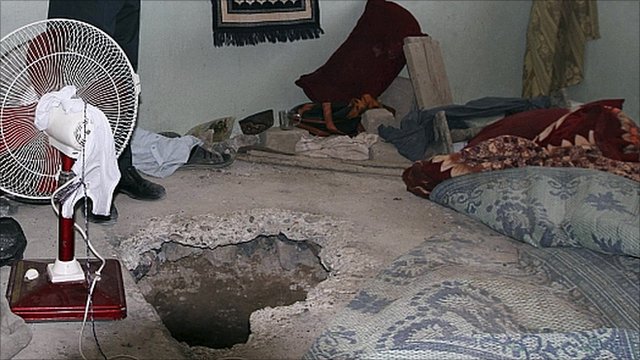 More than 470 inmates at a prison in southern Afghanistan have escaped through a tunnel hundreds of metres long and dug from outside the jail.
More than 470 inmates at a prison in southern Afghanistan have escaped through a tunnel hundreds of metres long and dug from outside the jail.
Officials in the city of Kandahar said many of those who escaped from Sarposa jail were Taliban insurgents.
The Kandahar provincial governor's office said at least 12 had since been recaptured but gave no further details.
A spokesman for Afghan President Hamid Karzai said the escape was a "disaster" which should never have happened.
Taliban spokesman Zabiullah Mujahid said it had taken five months to build the 360m (1,180ft) tunnel to a cell within the political wing.
He said it was dug from a house north-east of the prison that was rented by "friends" of the Taliban, and had to bypass security checkpoints and the main Kandahar-Kabul road.
About 100 of those who escaped were Taliban commanders, he added. Most of the others are thought to have been insurgents. The prison holds about 1,200 inmates.
Second jailbreak
"A tunnel hundreds of metres long was dug from the south of the prison into the prison and 476 political prisoners escaped last night," said prison director General Ghulam Dastageer Mayar.
One escapee told the BBC it had taken him about 30 minutes to walk the length of the tunnel. The escape took most of the night and vehicles were waiting at the exit point to take prisoners away.
Kandahar's provincial authorities said a search operation was under way.
So far, only about a dozen of the prisoners have been recaptured. Police said they were looking for men without shoes - many escaped barefoot.
The jailbreak is the second major escape from the prison in three years.
In June 2008 a suicide bomber blew open the Kandahar prison gates and destroyed a nearby checkpoint, freeing about 900 prisoners, many of them suspected insurgents.
After that, millions of pounds were spent upgrading the prison. The 2008 breakout was followed by a major upsurge in violence.
The BBC's Quentin Sommerville in Kabul says the escape is a further setback for security in the area, and for the fight against the insurgency.
"This is a blow," Afghan presidential spokesman Waheed Omar said. "A prison break of this magnitude, of course, points to a vulnerability."
The Afghan politician and former MP, Daoud Sultanzai, told the BBC that the escape exposed "the porousness of our security apparatus".
The prison is under Afghan control, but the Nato-led International Security Assistance Force (Isaf) said it was ready to provide assistance if requested by Afghan officials.
Insurgents considered to be the most dangerous are likely to be held at a high-security facility outside the US Bagram air base, north of Kabul, rather than at the Sarposa prison, analysts say.
Our correspondent says the jailbreak will be felt most in the villages and orchards around Kandahar, where Nato and Afghan soldiers spent a long summer last year fighting the Taliban.
Some of the men they captured are now free again, and with the fighting season about to start their enemy has just had its ranks replenished, he adds.
Nato forces are preparing for the long process of withdrawal. The first stage is the transfer of security powers to local forces from July, but Kandahar is not among the first tranche of provinces.



